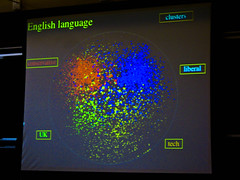‘What kinds of technologies do you use in your research? How do you use them? What is the impact on your research? Does technology change the kinds of questions you can ask? Why don’t you use more?'
As a corollary to this Learned Academies Special Projects linkage program, the Academy is about to conduct a digitisation scoping study to identity materials most useful to have digitised for researchers in the humanities. The aim of both projects is to compile a substantial evidence base to identity resources and tools to guide investment in these areas.
My contribution to the discussion is as a recent participant in the Oxford Internet Institute Summer Doctoral Programme, held at the Berkman Center for Internet & Society at Harvard Law School. Being involved in Internet studies, researchers often confront the problem that there aren’t established ways of undertaking qualitative or quantitative analysis. We are always already bricoleurs, mashing previous methods and modes of study to innovate when and where required. (On ethnography, Bryman (2004) comments that it is ‘generally recognized that the method entails a wide range of methods of data collection and sources’ (p. 292).) Do we still need a composite suite of tools to facilitate easier data collection and analysis? Those who are tracking the blogosphere appear to be saying so – colleagues have variously used IssueCrawler teamed with Technorati rankings, but feel that further tools could facilitate analysis. Some have been inspired to work on their own tools, such as OII SDP guest John Kelly, who presented interesting visualised slices of the blogosphere at Harvard.

A much–referenced portal is visualcomplexity.org, which lists over 500 projects, filtered into ‘pattern recognition’ and ‘social networks’, amongst others.
Here is a selection of other tools currently being employed by OII SDPers:
* A useful blogging bibliography tool from Ismael Peña-López, as a database employing two main classes, ‘Contacts’ and ‘Works’, to which five attributes are attached, ‘categories’, ‘types of authors’, ‘types of projects’, ‘languages’ and ‘countries’.
* In the Psych domain, Ralph Lengler of visual-literacy.org (recently rated highly with TED) introduced Tools for Internet-based data collection, and the Web-Experiment-List.
* Daithí Mac Síthigh employs YEP as a Mac-based (and unfortunately not-yet FLOSS) file management tool for pdfs, in which documents can be tagged and annotated. Note the subsequent alert to Skim! which appears to have improved annotation capability, to appease my concerns.
* Peter Ryan introduced TAPoR, a text analysis portal for research based at McMaster University, from a project contributed to by six of the leading Humanities computing centres in Canada. In particular, Peter spoke of HyperPo, a text analysis tool to examine the frequency and senses of words. I believe it outputs nice graphic distributions as a visual model of authors’ arguments.
* One way to track information online is through dapper.net, started with the vision of allowing users to extract and reuse data from nominated sites. Two services employing dapper are blotter, which graphs a blog’s popularity over time, and snag, a social network application which aggregates a user’s presence across the net.
* Marcus Foth mentioned two tools which have been of great use to him recently: dopplr, which displays colleagues’ travel plans, recently reviewed by the Guardian as a British dotcom to watch, and LinkedIn’s capacity to request connections.
* Alla Zollers, given her interest in tagging, commented about ma.gnolia, opining that it has a better interface than del.icio.us and emphasises the power of social networks. That said, there are probably more people using del.icio.us, and for that, the wisdom of the crowds may be… wiser? over there?!



No comments:
Post a Comment